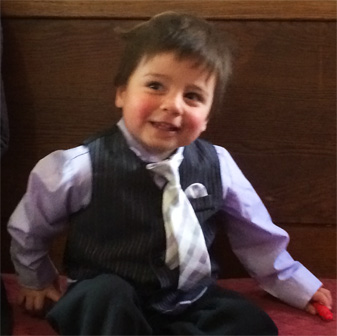I’m having doubts about my place in the church.
As I overcome trauma-induced beliefs that made me fear direct communication with God, I have less need for a giant mediating structure to serve as a lightning rod. As I gain confidence in my own perceptions, and in the availability of forgiveness for my faults, I have less need for sermons saying how everyone “should” feel and act.
I still long for a community centered on Christ. I want to give and receive the support, spiritual insight, and deep friendship that a shared faith journey can offer.
However, as I work towards higher levels of psychological integration and adulthood, I have to be part of a community that’s consciously working the same program. As I choose to break familial patterns of nonconsensual intimacy, I have to be part of a community that’s organized by consent and choice, not guilt-tripping the unchurched.
Such a community doesn’t form spontaneously in every group of people that calls itself a parish. It either has to be steered in that direction by an insightful pastor who is willing to yield power to the laypeople, or assembled outside church walls by the individuals who need it.
C.S. Lewis once wrote that the local parish, precisely because of its randomness, teaches the spiritual discipline of learning to share fellowship with people for whom you feel no natural affinity. This is an important practice, but I think he was wrong that a person’s hand-picked circle of spiritual friends is more likely to be a group of yes-men than the traditional church. Intentional communities can be diverse if they make a commitment to be so. (See, for example, the Freedom Circles at the Becoming Church program that I visited this spring.) Plus, there is a difference between the fruitful discomfort of listening to people outside your own race, social class, etc., and the pain of being a survivor in a church that doesn’t prioritize relational safety.
What about the sacraments? My mystical, physical union with Jesus in the Eucharist is my strongest reason for choosing church attendance over quiet reflection with Morning Prayer on my iPhone. When I see my fellow parishioners approach the altar rail, our relationship becomes solemnized, revealing a dimension of interconnection beyond ordinary acquaintance. I sense the possibility of the Body of Christ. It isn’t something I can access in solitude.
Surely the official church still has a monopoly on this power…or does it?
Feminist Catholic theologian Rosemary Radford Ruether wrote the following in her book Sexism and God-Talk (Boston: Beacon Press, 1983).
The residue of clericalism gives even liberal Protestants the impression that the administration of the sacraments is a function that most especially must be exercised by persons set aside in specialized ministry. But, in fact, representation of the community in rites of baptism, forgiveness, or Eucharist depends very little on specialized skills of learning. It is significant that the New Testament contains many words for special charisms and skills, but that they are not identified with special offices responsible for the sacraments of baptism or Eucharist…
…[As] people become empowered to make their contribution to shaping the worship life of the community… leadership does not disappear but assumes its true functionality when it is liberated from clerical monopoly over ministry, word, and sacrament. Leadership is called forth from within the community rather than imposed on it in a way that deprives the community of its own self-articulation. (pgs. 209-10)
This radically Protestant idea had never occurred to me. I set it aside as a memorable curiosity for several years, until now, when I realize I need a healthier reason to stay than “Where else can I go?”
Codependence taints the American church’s strategies for retaining members. A quote popped up in my Twitter feed from a progressive evangelical blogger. On the Internet, I’ve seen it variously attributed to Reinhold Niebuhr, Chuck Swindell, and Chuck Colson. “The church is a lot like Noah’s ark. If it weren’t for the storm outside, you couldn’t stand the stink inside.”
As a relationship move, this is like telling your wife, “Go ahead and try to leave. You couldn’t make it on your own.” It’s a counsel of despair, casting would-be reformers within the church as whiny children who won’t accept that life isn’t perfect. Actual children, to survive, have to convince themselves that the “stink” of their dysfunctional families is better on balance than the “storm” of an outside world where they’re not yet capable of living independently. But we’re adults now. “The world” is us. A church held together by fear and shame can never help its members recognize toxic interpersonal patterns in their own lives.
When I first became a Christian, I was a young woman fighting for the right to marry and leave my abusive home. I resonated with the church’s self-presentation as a tiny raft of stability adrift in an ocean of danger. When Christianity told me that human beings were helpless and sinful, I was relieved, because that was how I felt all the time. It was validating to be able to admit my imperfections to a supportive community, not like my home where any flaw would be pounced upon. Like my mother, the traditional church faced the fact that the world is full of bullies, sexual predators, and plagues of locusts–which is true, up to a point. The church promised safety without isolation, a huge step up from my life before.
So my disillusionment with church makes me feel very guilty and sad. I feel like I’m abandoning the institution that helped me reach escape velocity from my biological family. But this, too, is part of growing up. In Buddhist teacher Phillip Moffitt’s essay “Healing Your Mother (or Father) Wound“, he speaks of initiation as the fourth and final stage that good parent figures must complete, to release their protégés into adulthood with a blessing.
I’m reminded of Ray Bradbury’s short story “Jack-in-the-Box“, where a paranoid mother creates an elaborate ruse to convince her son that their house is, in fact, the entire world. When a crisis forces him to venture outside, he at first thinks that he must be dead:
Everything before him was new. Odors filled his nostrils, colors, odd shapes, incredible sizes filled his eyes.
If I run beyond the trees I’ll die, he thought, for that’s what Mother said. You’ll die, you’ll die.
But what’s dying? Another room? A blue room, a green room, far larger than all the rooms that ever were! But where’s the key? There, far ahead, a great half-open iron door, a wrought-iron gate. Beyond a room as large as the sky, all colored green with trees and grass! Oh, Mother, Teacher…
The story ends with a policeman bemusedly describing the strange kid who just ran past him.
“…He was laughing and crying, crying and laughing, both. He was jumping up and down and touching things. Things like lampposts, the telephone poles, fire hydrants, dogs, people. Things like sidewalks, fences, gates, cars, plateglass windows, barber poles. Hell, he even grabbed hold and looked at me, and looked at the sky, you should have seen the tears, and all the time he kept yelling and yelling something funny.”
“What did he yell?” asked the pedestrian.
“He kept yelling, ‘I’m dead, I’m dead, I’m glad I’m dead, I’m dead, I’m dead, I’m glad I’m dead, I’m dead, I’m dead, it’s good to be dead!'” The policeman scratched his chin slowly. “One of them new kid games, I guess.”
He who loses his life will find it…

